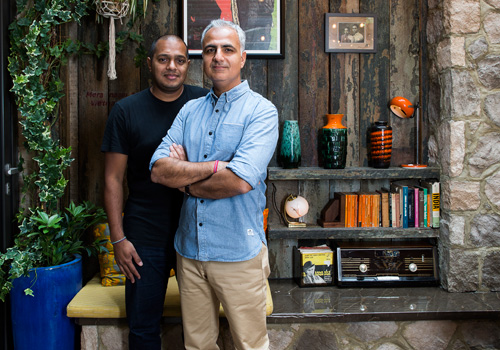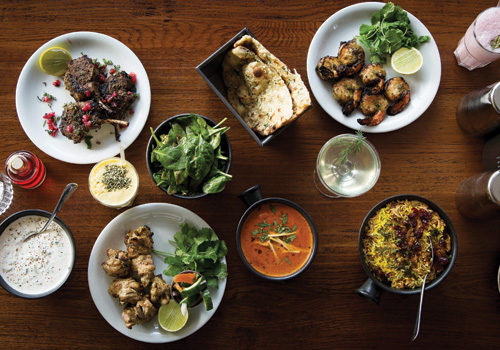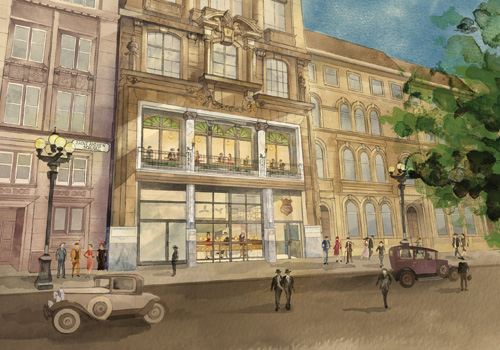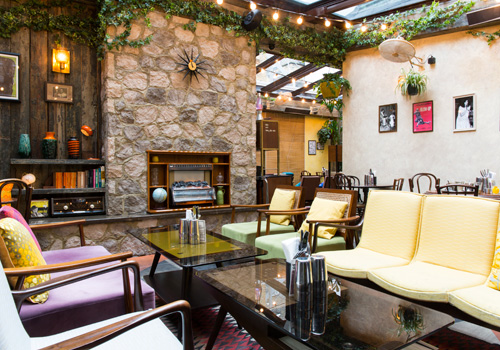Once upon a time in Bombay… the story behind Indian restaurant Dishoom
The intricate back story and minute attention to detail in creating each site in the Dishoom chain falls to two of its founders, Shamil and Kavi Thakrar. Neil Gerrard talks to them about being the authors of the group's next restaurant in Edinburgh
"Rules are a very Irani café thing," explains Shamil Thakrar, one of Dishoom's four co-founders, as he offers The Caterer a whistlestop tour of the 350-cover venue, a meticulous, loving and, above all, fun recreation of Bombay (now Mumbai) in the 1920s and 1930s.
"It isn't a museum and it shouldn't be too serious," Shamil continues. "It should maintain that glamour and fun at the same time as giving you a dose of proper authenticity."
Shamil, along with his cousin Kavi Thakrar and brothers Adarsh and Amar Radia, founded Dishoom in 2010. The quartet opened their first site in London's Covent Garden followed by sites in Shoreditch, Kingly Street in Soho and then King's Cross, and soon their first branch outside the capital will launch in
Edinburgh on 5 December.
Dishoom has enjoyed considerable success over the past six years. It was named Best Small Group in the 2016 edition of The Good Food Guide and it has won praise from the critics for everything from its breakfast bacon naan ("bloody GAWJUSS", according to The Guardian reviewer Marina O'Loughlin), to its friendly staffers and "first-class food" (Richard Vines of Bloomberg).
But the food and service are just part of an overarching experience of the kind that hospitality operators are increasingly trying to emulate in a bid to keep their customers loyal.
Dishoom takes its diners and transports them from drab London days to a nostalgic recreation of the Irani cafés of Bombay.
Shamil says: "Britain and India have a long relationship, going all the way back to the Raj, but it can feel a little bit full of clichés if you think of Bollywood or curry houses or cricket.
In a way, Bombay is none of that and nor is Bombay food. We love the idea of presenting something in a different way and the Irani cafés are very inspiring places because they were the first places in Bombay and even in India where you and I - the common man - could go to eat."
Small is beautiful
Shamil and Kavi take the lead when it comes to operating the business, and the process they go through to launch a new restaurant is painstaking.
Many restaurateurs may tell you they place an emphasis on authenticity, but these are people who take photographs of hinges and pinheads in India to make sure the look of their venue is just right. The way they dreamed up the King's Cross site is fairly typical of this approach. The restaurant is close to St Pancras International rail station, so Kavi and Shamil looked at its close relative, the Victoria Terminus in Bombay (now Mumbai's Chhatrapati Shivaji Terminus).
They imagined a young Parsi (Irani cafés originated among the Parsi community) stumbling on a rail warehouse, where he started selling chai. He grows this operation, opening a kitchen and adding more seats, until he takes over the whole warehouse. Interwoven in this is the theme of the Indian independence movement, with references to BR Ambedkar, the architect of India's constitution, alongside copies of original graffiti protesting against the Simon Commission (a
group consisting of seven British MPs, but no Indians, dispatched to India in 1928 to study constitutional reform) and photos by Homai Vyarawalla, one of the photographers of independence in India
On top of that are all sorts of contemporaneous features, from a clock that is a near-exact replica to the one found in the Chhatrapati Shivaji Terminus to tiles that echo exactly those you would find in Bombay in the 1930s and a replica AH Wheeler bookseller's booth.
In Kingly Street, adjoining Carnaby Street and the swinging Sixties has influenced their approach (all done with the help of designers Macaulay Sinclair) and Dishoom has even pressed its own record, called Slip-Disc, named after a rock club in Bombay.
For each project, Kavi and Shamil visit Mumbai twice - once to flesh out the concept, and a second time to buy the furniture. "I could go on about all this for an hour or two - maybe even a day or two," says Shamil. "Literally, no detail is too small."
"We really like to understand the importance of the area we are opening in, the building, what was happening at the time, and then we try to bring the two together," explains Kavi.
The Edinburgh site is a restaurant of around 200 covers in St Andrew Square in a 1920s building, originally occupied by the offices and warehouse of Forsyth's department store. The pair have once again looked to the 1920s for their story, of the real-life figure of Patrick Geddes, a Scottish sociologist born in the 1860s,
who worked on improving the slums of Edinburgh.
He had a link to Bombay, having been invited there by the then governor of Madras in the early 20th century and ended up living and working at the university for several years.
Geddes was reputed to spend a lot of his time in the grand reading rooms of Bombay's libraries, such as the David Sassoon Library and the People's Free Reading Room.
"We were thinking that maybe Geddes was around and was influenced by these spaces and Irani cafés, and then we played with the idea of what would have happened if maybe he had set one up himself," says Shamil.
It's possible that the fact that none of the co-founders comes from a restaurant background that dictates their unusual approach.
Adarsh and Amar are serial entrepreneurs, Kavi spent a spell in banking and Shamil worked in consultancy. "The fact that we are coming from it afresh and thinking about it differently means we are not approaching it like other restaurant people… I think you have got to like it beyond just creating a great restaurant,"
says Shamil.
"Unless you are into the history of it and the Bombay heritage for its own sake, then I don't think you can do what we do. All that obsession and crawling around archives in Bombay - you could save yourself a lot of bother and just build a restaurant."
Despite that, opening such a distance from their original operating base in London is altering the way they do things, says Shamil.
"Edinburgh is forcing us to be more systematic and more structured. I think that is entirely a good thing. We are also sharpening up our learning and development platform and communicating the career paths and so on that you can have in Dishoom."
Family friendly
The way the business looks after its people is, according to Kavi and Shamil, a very important factor. Every year for the past four years the company has held a "family mela" - a summer party for Dishoom's employees, their families and children, suppliers, landlords and friends of Dishoom. Even if staff have only
been with the business for a short time, they still receive an invitation. This summer's party was for 950 people. "People have a great time and everyone gets to hang o ut with each other's families and meet the suppliers," says Kavi. "It's our day to say thank you and it is like a free festival with no queues," adds Shamil.
Whenever a member of the team is promoted o the post of head chef or manager, they have the chance to take a group trip to Bombay with Kavi as their tour guide. And every Christmas, the managers go on a trip to somewhere like Paris or Belmond Le Manoir aux Quat'Saisons in Oxfordshire.
Clearly, these benefits don't come cheap, but Shamil asserts that they have helped to significantly increase staff retention over the past 18 months to two years. Promotion levels have risen too, to around 85 in the past 12 months.
"I think our employee benefits proposition and the way we pay people is pretty much industry leading. The focus we want to have now is on learning and development," says Shamil. To that end, the business has hired Andy O'Callaghan, the former head of people at Harris + Hoole, as well as some trainers to put
together a department to offer formal training.
"Our goal is to be brilliant at this and not necessarily in a way that looks at industry best practice - we are going to look at it ourselves a fresh and create fantastic people training and development," says Shamil.
Part of the motivation for Shamil is to see more people entering the hospitality sector and recognising what it has to offer. "The industry is often seen as the poor relation to desk jobs and I think that is just nonsense," he says. "It shouldn't be that way. Whether it is school leavers or graduates, they can earn great money and become a serious leader. You can be a general manager by the age of 30."
Of course, this formalisation - the focus on training and the first site outside London - suggests Dishoom is on the verge of rolling out sites out more quickly. But Kavi and Shamil say they are not in any rush and, indeed, the detailed approach they take to devising a story for each restaurant could be a limiting factor.
"Making each Dishoom is such a labour of love that there is a sort of bottleneck on what we can do," explains Shamil. "I don't think we are in a rush, but as we build more stories, we might do more Dishooms. When we talk to industry people, some tell us we can do loads of them, whereas others say no, you need to
keep it really special."
Certainly, they take a different approach when it comes to site selection, too. King's Cross may have been transformed out of all recognition in recent years, but the Dishoom site there is hardly obvious, tucked away on Granary Square with a side entrance facing the canal. That it is heaving on a Thursday lunchtime
and, like other sites, sees queues of an evening, is testament to the brand's popularity.
And in Shoreditch, despite having access to an entrance on Shoreditch High Street, Dishoom prefers an entrance on the quieter Boundary Street instead. "It is quite interesting in King's Cross, because there is no real natural footfall," says Shamil. "No one walks past here. Every person who comes for breakfast, lunch or dinner has made a conscious decision to get here. We are pretty confident being off the main drag. Maybe it is an indulgence, but we like to be in sites that showcase
what we do nicely."
The common touch
It helps that the customer base, in keeping with the tradition of Irani cafés, is varied. According to Shamil, it ranges from students and hipsters to the steel billionaire Lakshmi Mittal. "I don't think there are many restaurants that can do that," he adds.
Dishoom has also managed to widen its appeal by making a major virtue of breakfast - hence the reviews from the likes of O'Loughlin. Around half of Dishoom's total trade comes during the daytime before 6pm.
"When we first started doing breakfast in Covent Garden, people thought we were nuts," claims Shamil. "Breakfast is crazy any way, but Indian breakfast is even more of a stretch. It took us a long time."
The pair aren't overly keen to share details on the financials of the company. When I ask how the business is funded and how much it costs to open a new site, hamil replies simply: "We are privately funded and it costs quite a lot."
But accounts filed in Companies House show that the business is growing rapidly. It saw an 84% increase in turnover in 2015 (which included the contribution from the recently opened Kingly Street site) to £18.8m.
Adjusted EBITDA before depreciation, loss on disposal of fixed assets and pre-opening costs was £1.6m, up from £1.5m the year before.
While they keep their cards close to their chests on the question of expansion, it's not hard to imagine that we will see more carefully crafted stories and more of those quirky signs in restaurants elsewhere soon.
Shamil Thakrar on…
… managing queues "I think we were spectacularly bad at that when we first started generating queues. They weren't very well managed for a while, but now we have decided to welcome you into the Dishoom experience the moment you get to the back of the queue. Someone will come and ask you how you are and tell you how long you will have to wait, and we will serve you either a sherry or a chai in the queue while you wait."
… disruptive influences, like Deliveroo and Uber Eats
"Innovation is going to happen and it has to change the way we do things. But just as the advent of VHS, then DVDs and then the online distribution of film hasn't done anything to cinemas, I think people will still want to go out and have a collective experience with other people eating food, even if other people may like to use a takeaway app. We don't use one at Dishoom - it's just not the same as being here."
Dishoom's charity work When The Caterer interviews Kavi and Shamil Thakrar, it is the week of Raksha Bandhan (meaning "bond of protection") - a Hindu festival celebrating brotherhood and love, which sees sisters tie a rakhi (sacred thread) on their brother's wrist. Dishoom adopted the practice in its restaurants and pledged to donate £1 to the Seeds of Peace charity for every rakhi tied.
Seeds of Peace brings together young people from Israel and Palestine to foster understanding between the two groups. The group also has a relationship with
charity Magic Breakfast, which provides breakfasts to hungry and malnourished children in disadvantaged parts of the UK.
Continue reading
You need to be a premium member to view this. Subscribe from just 99p per week.
Already subscribed? Log In











